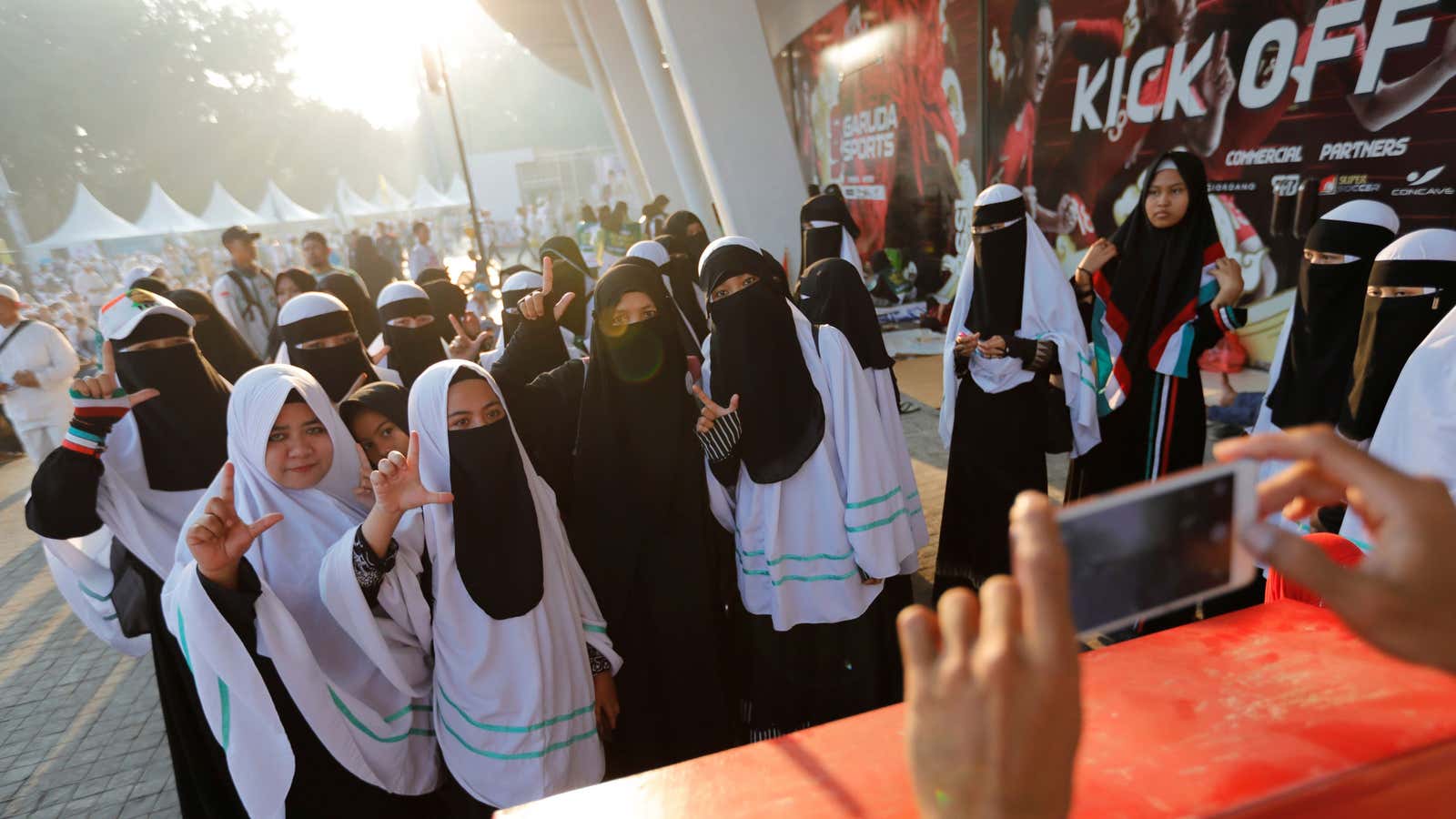Indonesian president Joko Widodo’s Twitter account has been interspersing tweets that show him in Saudi Arabia meeting with royals and conducting a minor pilgrimage with his wife in Mecca with videos that show off new roads in remote areas and subway trains.
It’s a snapshot of two key issues running through his second presidential campaign. A moderate candidate focused on his infrastructure and other economic achievements, Jokowi, as he is known, is ahead in polls in the nation of 264 million, which holds national and local elections April 17.
In 2014, he beat his current rival, former army general Prabowo Subianto (son-in-law to former dictator Suharto, whose regime fell in 1998). In that election too, showing personal piety as a Muslim was important and Jokowi made a quick trip to Mecca, as he did this past weekend.
Religion is even more prominent this time. In 2016 and 2017, Muslim hardliners organized demonstrations against Basuki Purnama, an Indonesian Chinese Christian running for governor of Jakarta to whom Jokowi was close. Ahok, as Basuki is better known, had been elected deputy governor running alongside Jokowi in 2012; when Jokowi gave up the governor post in 2014 after being elected president for the first time, he appointed Ahok to take his place.
Amid accusations of blasphemy over comments he made in 2016, Ahok lost the election and then convicted of blasphemy. (He was released early, in January.)
Nava Nuraniyah of Jakarta’s Institute for Policy Analysis of Conflict says Jokowi learned from the anti-Ahok movement “that he ignored Islamist mobilization at his peril.” In a report for the Indonesian think tank (pdf, p. 20) on the role of Islam in these elections, she wrote that Jokowi could have responded another way to that lesson:
He could have done so by articulating a vision of Indonesia in which all citizens were equal, rather than the majoritarian view that Muslims were more equal than others, and a vision of Islam that was respectful of all faiths. Instead he chose to emphasise his personal piety, use a variety of repressive tactics against Islamist rallies and clerics. If he wins a second term, he needs to do more…Through his choices for ministers of education, justice and religious affairs, he needs to set the country on a course in which majoritarianism is challenged from kindergarten on up—because that is where the Islamists start.
Instead, Jokowi’s camp returned in kind the accusations that he’s sometimes faced around religion and heritage, suggesting it’s Prabowo who’s not Muslim enough. In December, Jokowi supporters tried to use a video of Prabowo dancing at a family Christmas party—originally posted by his niece—to make the former general look bad, said the report, citing CNN Indonesia. Jokowi also chose a prominent cleric who had called for Ahok’s prosecution as his running mate.
Neither candidate would seem suited to a campaign that is particularly hardline on religion. Prabowo’s father-in-law Suharto suppressed political Islam. His own parents married despite being of different religions—Prabowo’s mother is Christian though he’s officially a Muslim according to his national ID card, for which Indonesia asks citizens to list their religion.
In many ways Indonesia’s election has parallels to India’s. In Indonesia, as in India—another diverse democracy holding elections—or for that matter, the US, the divides are not only between majorities and minorities. They’re also about divisions within the majority about whether the country should be shaped around the beliefs and sentiments of the majority.
Islam’s importance in the public sphere, after being pushed away from politics during Suharto’s time, has taken a different turn with the advent of democracy, and then of social media. Indonesia is seeing a mashup of online influencer culture and conservatism. Prabowo’s supporters include a 1980s pop star who’s entry into politics and messaging around morality have built her a following among women, and another group called the Sexy Mothers.
“Twenty years after the reforms we see that Islamic expression is a lot more varied and because of the role of social media, many other expressions of conservatism have found an audience,” said Nuraniyah, noting that with celebrity participation, “pop culture and consumerism is going hand in hand with conservatism.”
Fake news, often around religion or ethnicity—shaped by both antipathy to Indonesia’s ethnic Chinese population and suspicion of China itself—is a big problem in Indonesia. Earlier this week, Facebook took down more than 200 Indonesia-related pages and groups spreading polarizing messages.
If Jokowi wins, it could mean that the electorate is keeping economic and other issues separate from matters of faith. In the more unlikely event of a Prabowo win, it could signal voters want faith to play a larger role in the political sphere.
“Islam is being used on both sides to represent either political identity or the personal sphere,” said Nuraniyah. “This is the essence of the debate between the new Muslim and the old Muslim.”
